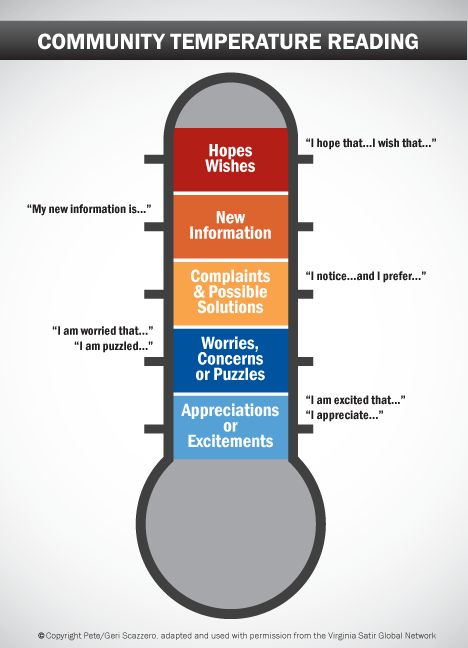Community Temperature Reading

The Five Categories
-
APPRECIATIONS
-
- We think of them in our heads but often only say them when someone has gone above and beyond the call of duty.
- Some families and cultures never express appreciations.
- God wired our brains to give and receive appreciations.
e.g., “I appreciate you putting out the garbage twice a week.”
e.g., “I appreciate you arriving early and getting the coffee ready before the meeting.”
-
PUZZLES
- We use them when we are tempted to make negative assumptions about people, especially when we don’t have all the information.
- Puzzles prevent us from jumping to conclusions and negatively interpreting what is going on around us.
- Puzzles give us an opportunity to slow down and ask questions instead of making judgments.
Puzzle is a loving word.
e.g., Instead of being upset and not saying anything at all or angrily saying, “Why didn’t you return my phone call?” you can say, “I’m puzzled as to why you didn’t return my phone call.”
e.g., Instead of remaining silent and annoyed that a friend arrived 20 minutes late for a lunch date, you say, “I’m puzzled why you are 20 minutes late.”
-
COMPLAINTS WITH POSSIBLE SOLUTIONS
-
- All relationships have complaints or things we don’t like. This is normal.
- Two challenges with complaints: (1) Some of our families grew up with an unwritten rule: If you don’t have anything nice to say, don’t say anything at all.
It is very easy to complain and not take any responsibility for a possible solution.
-
- The purpose of “Complaints with Possible Solutions” is to help you with small irritations and annoyances that arise each day.
- Use the phrase “I notice . . . and I prefer . . .”
e.g., “I notice you often leave the lights on in our apartment when you leave, and I prefer you turn them off.” e.g., “I notice our meetings start late, and I prefer we start at the agreed-upon time.”
-
- The person with the complaint takes responsibility for a possible solution.
- Keep complaints light in this first skill—the Community Temperature Reading.
-
NEW INFORMATION
-
- This can take many forms—events, appointments, new decisions, achievements, opportunities, or activities. Relationships can only grow when people know what is happening in each other’s lives, both the trivial as well as the important. g., “Our professor moved the exam so I can go to the movies this week.” e.g., “I’m exploring a different job within my company!”
-
HOPES AND WISHES
-
- Hopes and wishes offer windows into our unique souls, revealing significant parts of who we are.
- Our relationships deepen when we share our hopes and dreams with one another. e.g., “I hope we can continue our rhythm of visiting one National Park a year. e.g., “I hope to sleep in and get some extra rest this weekend.
Stop Mindreading and Clarify Expectations
Skill Challenge One:
You share the story you are telling yourself and then ask for the truth.
- No mind-reading.
- No assumptions.
- No judging.
Skill Challenge Two:
Clarify Expectations and then come to a compromise about said expectations.
Have you ever said, “They should just know…” The kids should just know to do their homework. He should just know to throw out the trash. He should just know to use the open milk carton as opposed to the unopened one.
We all have expectations but they are invalid if:
- They are Unconscious – My expectation when Pastor and I got married was that he would do all the traditional things that a man does: pay the bills, repairs around the house and on the cars. My dad did and so I was expecting him to do the same. I wasn’t even aware of this expectation until I was disappointed that he didn’t do those things.
- They are Unrealistic – Expecting Pastor to do those things was unrealistic because I hadn’t even spoken to him about it. I just assumed.
- They are Unspoken – 90% of conflict is the 10% you don’t say. We never verbalize or tell the other person what our expectations are. They can’t read your mind and shouldn’t. Just verbalize your expectation. “Hey, hon, I prefer that you wouldn’t leave your clothes on the bathtub.” Or “I expect the dishes to be done when I get home.” Be clear about your expectations.
- Un-agreed-Upon – If the expectation is not agreed upon then there isn’t going to be a solution. Sit down, talk, and come up with a solution that would benefit both.
The secret to EQ is this: Emotionally Intelligent Adults would rather RESOLVE the tension than DISSOLVE the relationship.

